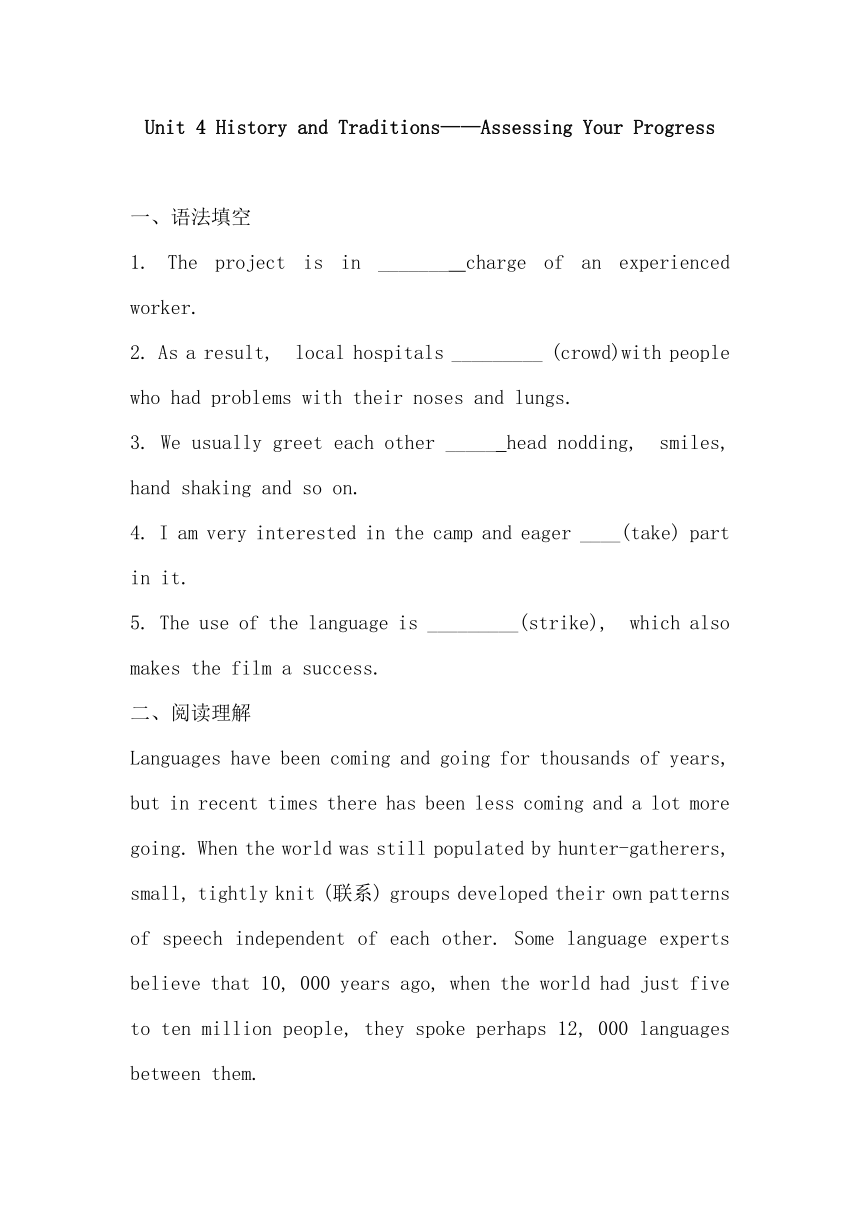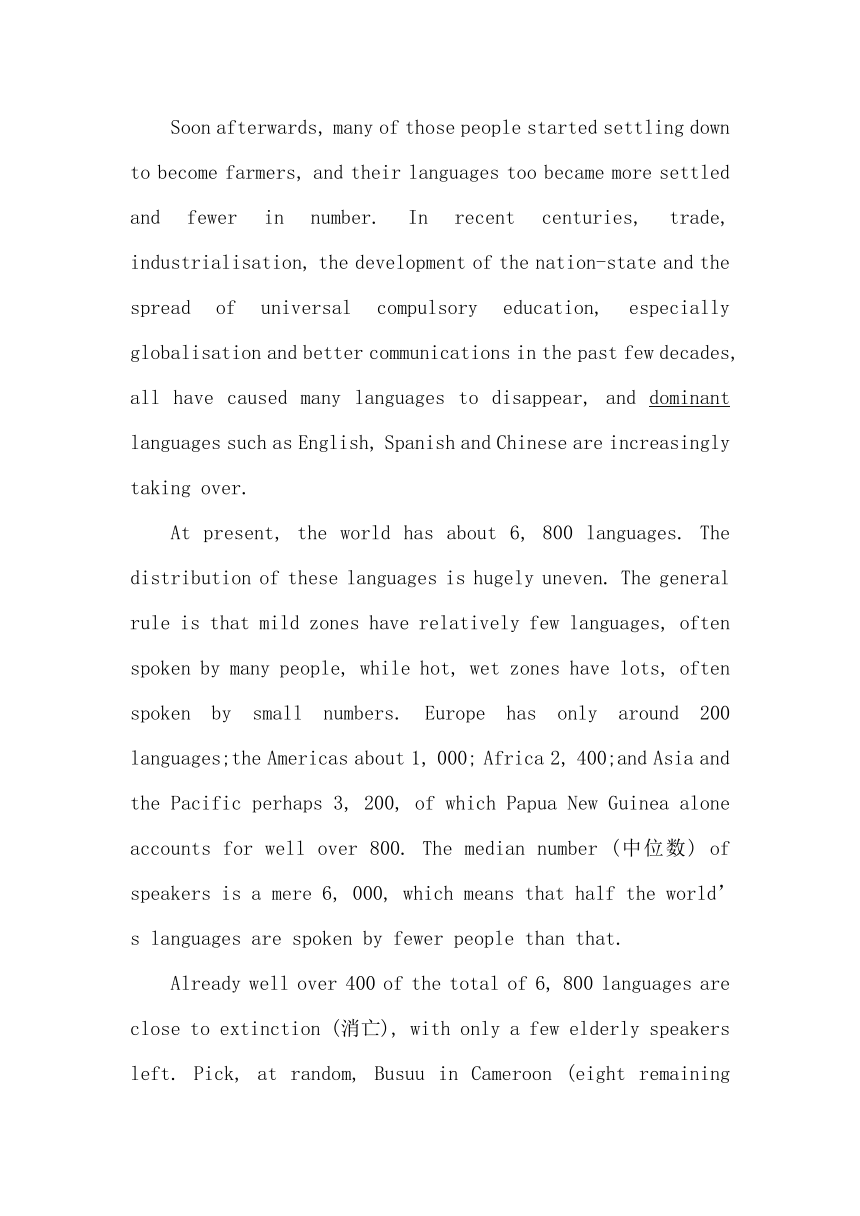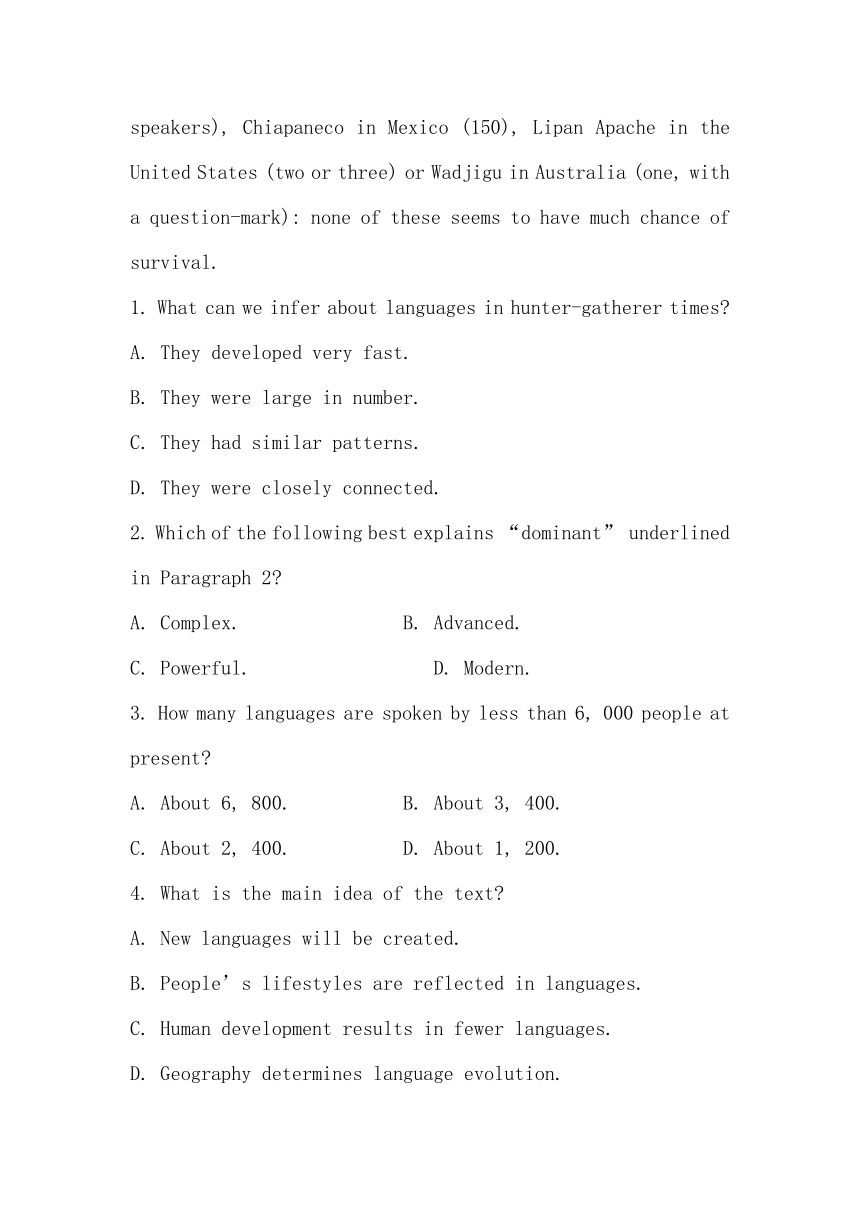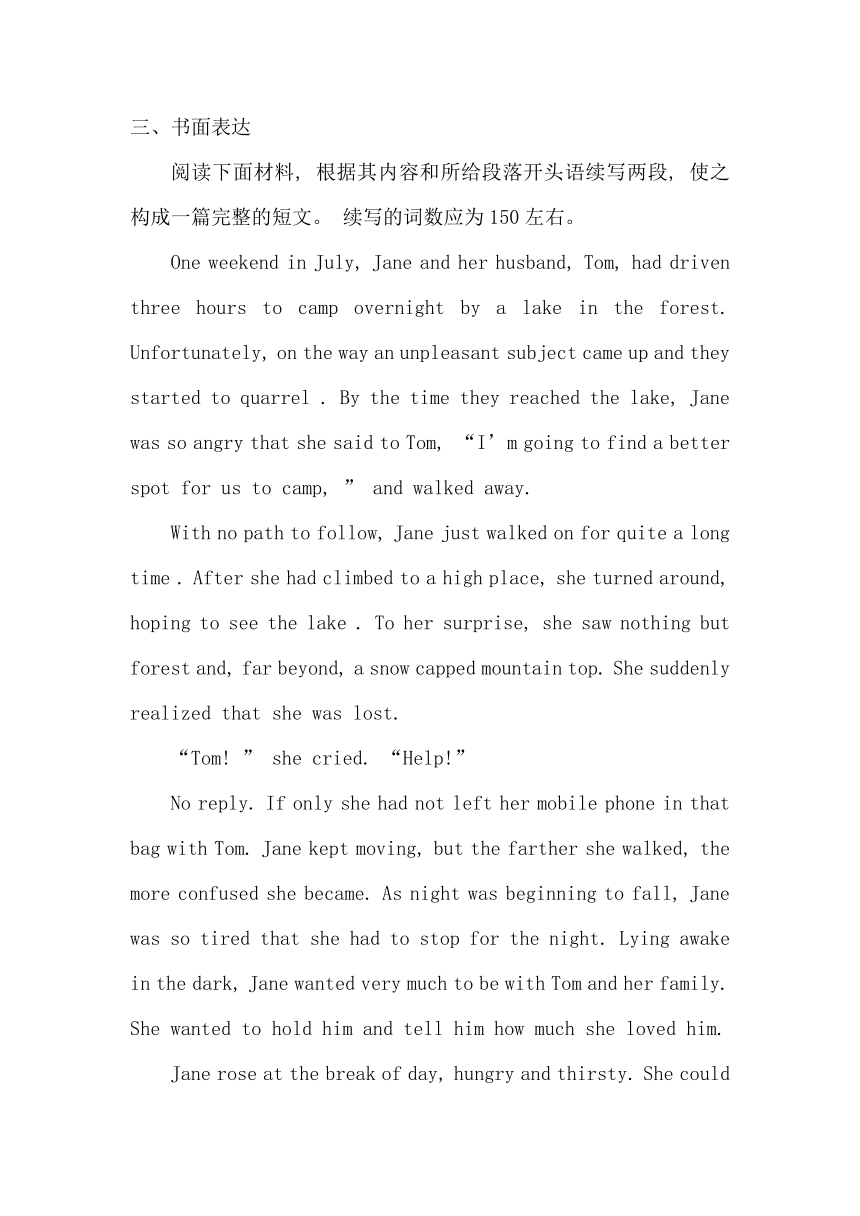人教版(2019)必修第二册Unit 4 History and Traditions-Assessing Your Progress课后检测练(含答案)
文档属性
| 名称 | 人教版(2019)必修第二册Unit 4 History and Traditions-Assessing Your Progress课后检测练(含答案) |

|
|
| 格式 | zip | ||
| 文件大小 | 18.3KB | ||
| 资源类型 | 教案 | ||
| 版本资源 | 人教版(2019) | ||
| 科目 | 英语 | ||
| 更新时间 | 2022-02-23 00:00:00 | ||
图片预览




文档简介
Unit 4 History and Traditions——Assessing Your Progress
一、语法填空
1. The project is in _______ charge of an experienced worker.
2. As a result, local hospitals _________ (crowd)with people who had problems with their noses and lungs.
3. We usually greet each other _____ head nodding, smiles, hand shaking and so on.
4. I am very interested in the camp and eager ____(take) part in it.
5. The use of the language is _________(strike), which also makes the film a success.
二、阅读理解
Languages have been coming and going for thousands of years, but in recent times there has been less coming and a lot more going. When the world was still populated by hunter-gatherers, small, tightly knit (联系) groups developed their own patterns of speech independent of each other. Some language experts believe that 10, 000 years ago, when the world had just five to ten million people, they spoke perhaps 12, 000 languages between them.
Soon afterwards, many of those people started settling down to become farmers, and their languages too became more settled and fewer in number. In recent centuries, trade, industrialisation, the development of the nation-state and the spread of universal compulsory education, especially globalisation and better communications in the past few decades, all have caused many languages to disappear, and dominant languages such as English, Spanish and Chinese are increasingly taking over.
At present, the world has about 6, 800 languages. The distribution of these languages is hugely uneven. The general rule is that mild zones have relatively few languages, often spoken by many people, while hot, wet zones have lots, often spoken by small numbers. Europe has only around 200 languages;the Americas about 1, 000; Africa 2, 400;and Asia and the Pacific perhaps 3, 200, of which Papua New Guinea alone accounts for well over 800. The median number (中位数) of speakers is a mere 6, 000, which means that half the world’s languages are spoken by fewer people than that.
Already well over 400 of the total of 6, 800 languages are close to extinction (消亡), with only a few elderly speakers left. Pick, at random, Busuu in Cameroon (eight remaining speakers), Chiapaneco in Mexico (150), Lipan Apache in the United States (two or three) or Wadjigu in Australia (one, with a question-mark): none of these seems to have much chance of survival.
1. What can we infer about languages in hunter-gatherer times
A. They developed very fast.
B. They were large in number.
C. They had similar patterns.
D. They were closely connected.
2. Which of the following best explains “dominant” underlined in Paragraph 2
A. Complex. B. Advanced.
C. Powerful. D. Modern.
3. How many languages are spoken by less than 6, 000 people at present
A. About 6, 800. B. About 3, 400.
C. About 2, 400. D. About 1, 200.
4. What is the main idea of the text
A. New languages will be created.
B. People’s lifestyles are reflected in languages.
C. Human development results in fewer languages.
D. Geography determines language evolution.
三、书面表达
阅读下面材料, 根据其内容和所给段落开头语续写两段, 使之构成一篇完整的短文。 续写的词数应为150左右。
One weekend in July, Jane and her husband, Tom, had driven three hours to camp overnight by a lake in the forest. Unfortunately, on the way an unpleasant subject came up and they started to quarrel . By the time they reached the lake, Jane was so angry that she said to Tom, “I’m going to find a better spot for us to camp, ” and walked away.
With no path to follow, Jane just walked on for quite a long time . After she had climbed to a high place, she turned around, hoping to see the lake . To her surprise, she saw nothing but forest and, far beyond, a snow capped mountain top. She suddenly realized that she was lost.
“Tom! ” she cried. “Help!”
No reply. If only she had not left her mobile phone in that bag with Tom. Jane kept moving, but the farther she walked, the more confused she became. As night was beginning to fall, Jane was so tired that she had to stop for the night. Lying awake in the dark, Jane wanted very much to be with Tom and her family. She wanted to hold him and tell him how much she loved him.
Jane rose at the break of day, hungry and thirsty. She could hear water trickling(滴落)somewhere at a distance. Quickly she followed the sound to a stream. To her great joy, she also saw some berry bushes. She drank and ate a few berries. Never in her life had she tasted anything better. Feeling stronger now, Jane began to walk along the stream and hope it would lead her to the lake.
As she picked her way carefully along the stream, Jane heard a helicopter. Is that for me Unfortunately, the trees made it impossible for people to see her from above. A few minutes later, another helicopter flew overhead. Jane took off her yellow blouse, thinking that she should go to an open area and flag them if they came back again.
Paragraph 1:
But no more helicopters came and it was getting dark again.
____________________________________________________________________
____________________________________________________________________
____________________________________________________________________
Paragraph 2:
It was daybreak when Jane woke up.
____________________________________________________________________
____________________________________________________________________
____________________________________________________________________
答案和解析
一、语法填空
1.the
2.were crowded
3.with
4.to take
5.striking
二、阅读理解
1.B。推理判断题。根据第一段中的When the world was still populated by hunter-gatherers. . . they spoke perhaps 12, 000 languages between them. 可知, 在狩猎时代虽然人口很少, 但语言种类很多。
2.C。词义猜测题。根据第二段最后一句中的increasingly taking over, 意为“越来越占据统治地位”, 可知dominant意为“占优势的;占支配地位的”, 与C项同义。
3.B。细节理解题。根据第三段最后一句The median number of speakers is a mere 6, 000, which means that half the world’s languages are spoken by fewer people than that. 以及第四段第一句中的the total of 6, 800 languages可知答案为B。
4. C。主旨大意题。通读全文可知, 文章主要讲述随着人类社会的发展, 语言的种类越来越少, 故C项为正确答案。
三、书面表达
Paragraph 1:
But no more helicopters came and it was getting dark again. The temperature got lower at night than in the daytime. Jane put on her yellow blouse. At that moment, tiredness surrounded her. She felt tired both physically and mentally. But she kept on walking forward because she really wanted to meet Tom as soon as possible. She walked slowly in darkness. Following the stream for about two hours, Jane couldn’t support herself, so she found a flat ground to spend the long and hard night.
Paragraph 2:
It was daybreak when Jane woke up. She felt hungry and tired. Anyway, Jane began her hard trip again. An hour later, she saw an old man cutting woods at a distance. To her great joy, the man knew the way to the lake, which meant hope to her. Fortunately, a helicopter flew overhead just at that moment. Jane waved her yellow blouse wildly. This time, the helicopter found her and took her to her husband.
一、语法填空
1. The project is in _______ charge of an experienced worker.
2. As a result, local hospitals _________ (crowd)with people who had problems with their noses and lungs.
3. We usually greet each other _____ head nodding, smiles, hand shaking and so on.
4. I am very interested in the camp and eager ____(take) part in it.
5. The use of the language is _________(strike), which also makes the film a success.
二、阅读理解
Languages have been coming and going for thousands of years, but in recent times there has been less coming and a lot more going. When the world was still populated by hunter-gatherers, small, tightly knit (联系) groups developed their own patterns of speech independent of each other. Some language experts believe that 10, 000 years ago, when the world had just five to ten million people, they spoke perhaps 12, 000 languages between them.
Soon afterwards, many of those people started settling down to become farmers, and their languages too became more settled and fewer in number. In recent centuries, trade, industrialisation, the development of the nation-state and the spread of universal compulsory education, especially globalisation and better communications in the past few decades, all have caused many languages to disappear, and dominant languages such as English, Spanish and Chinese are increasingly taking over.
At present, the world has about 6, 800 languages. The distribution of these languages is hugely uneven. The general rule is that mild zones have relatively few languages, often spoken by many people, while hot, wet zones have lots, often spoken by small numbers. Europe has only around 200 languages;the Americas about 1, 000; Africa 2, 400;and Asia and the Pacific perhaps 3, 200, of which Papua New Guinea alone accounts for well over 800. The median number (中位数) of speakers is a mere 6, 000, which means that half the world’s languages are spoken by fewer people than that.
Already well over 400 of the total of 6, 800 languages are close to extinction (消亡), with only a few elderly speakers left. Pick, at random, Busuu in Cameroon (eight remaining speakers), Chiapaneco in Mexico (150), Lipan Apache in the United States (two or three) or Wadjigu in Australia (one, with a question-mark): none of these seems to have much chance of survival.
1. What can we infer about languages in hunter-gatherer times
A. They developed very fast.
B. They were large in number.
C. They had similar patterns.
D. They were closely connected.
2. Which of the following best explains “dominant” underlined in Paragraph 2
A. Complex. B. Advanced.
C. Powerful. D. Modern.
3. How many languages are spoken by less than 6, 000 people at present
A. About 6, 800. B. About 3, 400.
C. About 2, 400. D. About 1, 200.
4. What is the main idea of the text
A. New languages will be created.
B. People’s lifestyles are reflected in languages.
C. Human development results in fewer languages.
D. Geography determines language evolution.
三、书面表达
阅读下面材料, 根据其内容和所给段落开头语续写两段, 使之构成一篇完整的短文。 续写的词数应为150左右。
One weekend in July, Jane and her husband, Tom, had driven three hours to camp overnight by a lake in the forest. Unfortunately, on the way an unpleasant subject came up and they started to quarrel . By the time they reached the lake, Jane was so angry that she said to Tom, “I’m going to find a better spot for us to camp, ” and walked away.
With no path to follow, Jane just walked on for quite a long time . After she had climbed to a high place, she turned around, hoping to see the lake . To her surprise, she saw nothing but forest and, far beyond, a snow capped mountain top. She suddenly realized that she was lost.
“Tom! ” she cried. “Help!”
No reply. If only she had not left her mobile phone in that bag with Tom. Jane kept moving, but the farther she walked, the more confused she became. As night was beginning to fall, Jane was so tired that she had to stop for the night. Lying awake in the dark, Jane wanted very much to be with Tom and her family. She wanted to hold him and tell him how much she loved him.
Jane rose at the break of day, hungry and thirsty. She could hear water trickling(滴落)somewhere at a distance. Quickly she followed the sound to a stream. To her great joy, she also saw some berry bushes. She drank and ate a few berries. Never in her life had she tasted anything better. Feeling stronger now, Jane began to walk along the stream and hope it would lead her to the lake.
As she picked her way carefully along the stream, Jane heard a helicopter. Is that for me Unfortunately, the trees made it impossible for people to see her from above. A few minutes later, another helicopter flew overhead. Jane took off her yellow blouse, thinking that she should go to an open area and flag them if they came back again.
Paragraph 1:
But no more helicopters came and it was getting dark again.
____________________________________________________________________
____________________________________________________________________
____________________________________________________________________
Paragraph 2:
It was daybreak when Jane woke up.
____________________________________________________________________
____________________________________________________________________
____________________________________________________________________
答案和解析
一、语法填空
1.the
2.were crowded
3.with
4.to take
5.striking
二、阅读理解
1.B。推理判断题。根据第一段中的When the world was still populated by hunter-gatherers. . . they spoke perhaps 12, 000 languages between them. 可知, 在狩猎时代虽然人口很少, 但语言种类很多。
2.C。词义猜测题。根据第二段最后一句中的increasingly taking over, 意为“越来越占据统治地位”, 可知dominant意为“占优势的;占支配地位的”, 与C项同义。
3.B。细节理解题。根据第三段最后一句The median number of speakers is a mere 6, 000, which means that half the world’s languages are spoken by fewer people than that. 以及第四段第一句中的the total of 6, 800 languages可知答案为B。
4. C。主旨大意题。通读全文可知, 文章主要讲述随着人类社会的发展, 语言的种类越来越少, 故C项为正确答案。
三、书面表达
Paragraph 1:
But no more helicopters came and it was getting dark again. The temperature got lower at night than in the daytime. Jane put on her yellow blouse. At that moment, tiredness surrounded her. She felt tired both physically and mentally. But she kept on walking forward because she really wanted to meet Tom as soon as possible. She walked slowly in darkness. Following the stream for about two hours, Jane couldn’t support herself, so she found a flat ground to spend the long and hard night.
Paragraph 2:
It was daybreak when Jane woke up. She felt hungry and tired. Anyway, Jane began her hard trip again. An hour later, she saw an old man cutting woods at a distance. To her great joy, the man knew the way to the lake, which meant hope to her. Fortunately, a helicopter flew overhead just at that moment. Jane waved her yellow blouse wildly. This time, the helicopter found her and took her to her husband.
